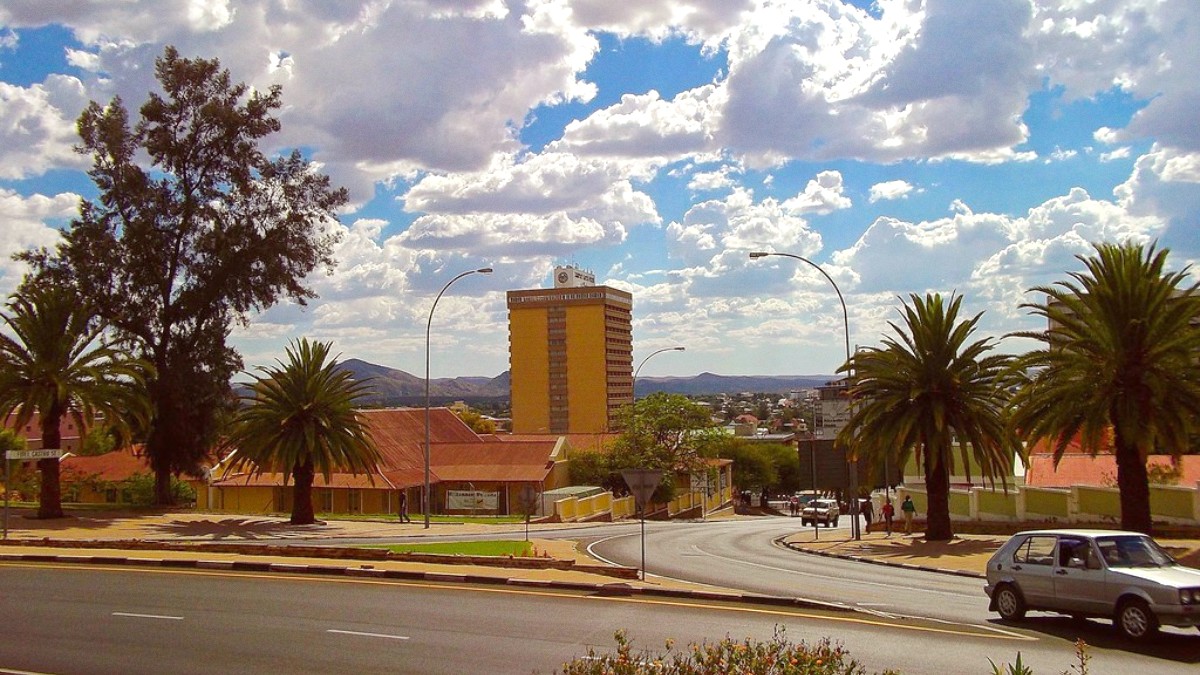
Namibia
Namibian cuisine is a flavorful blend. Meat forms a central part of the diet, reflecting the country's strong agricultural and pastoral traditions, especially cattle and game farming.
Expect to find game meats (like kudu, oryx, and springbok), beef, and lamb widely available. Maize meal, often prepared as "pap" (a thick porridge), serves as a staple carbohydrate. Potatoes and various root vegetables accompany many dishes. Kapana, thinly sliced grilled meat, is a popular street food. German influences include dishes like Eisbein (pork knuckle), Schnitzel (breaded cutlets), and various types of sausages. Spices are generally mild, focusing on the natural flavors of the ingredients.
While Windhoek has a national culinary overview, coastal areas like Swakopmund feature more seafood. Northern regions incorporate more traditional dishes based on millet or sorghum.
Kapana, thinly sliced grilled meat, is a popular street food found at informal open-air markets, especially in the Katutura area. It is a social and tasty experience.
Braaivleis (barbecue) represents a communal dining experience, similar to South African braai, enjoyed with friends and family.
A highlight of Namibian cuisine. Try oryx steak, kudu fillet, or springbok. These meats are lean and flavorful, often served grilled or in hearty stews.
Widely available in many restaurants across Windhoek, especially those catering to visitors.
A popular street food. Kapana consists of thinly sliced, grilled beef, often seasoned with a mix of spices and served with a chili sauce.
Find it at informal open-air markets, specifically in the Katutura area.
Dried, cured meat snacks, similar to jerky but with a distinct preparation and flavor profile. Biltong is cured meat, while Droëwors are dried sausages.
Find them in supermarkets, butcheries, and sometimes at local markets. Good snacks for road trips.
Popular local beers, brewed according to German purity laws, known for their crisp taste.
Amarula: creamy liqueur from marula fruit. Rooibos Tea: caffeine-free herbal tea. Oshikundu: traditional non-alcoholic fermented millet drink.
Several upmarket hotels and standalone restaurants feature fine dining experiences. These offer gourmet versions of local and international cuisine.
A wide selection of restaurants offer diverse menus. Find steakhouses specializing in game meat, Italian, Portuguese, Asian, and other international eateries.
Informal markets and stalls in areas like Katutura offer budget-friendly options, especially Kapana. This offers a direct experience of local food culture.
Markets like Okuryangava (in Katutura) and Soweto Market offer authentic local food experiences, including fresh produce and prepared dishes.
These markets provide a glimpse into daily life.
Due to its diverse population, Windhoek has restaurants serving Italian, Portuguese, Indian, Chinese, and other international cuisines.
This offers variety if a break from local flavors is desired.
A lively institution in Windhoek.
Wide range of game meats available.
Popular with both locals and visitors.
Features an unique and rustic ambiance.
Awareness of gluten-free and other common allergens is growing but not as widespread as in some Western countries.
Communicate dietary restrictions clearly and directly with restaurant staff.
Carrying a Translation card for dietary needs can be helpful for clear communication.
For severe allergies, self-catering offers the most control.
For severe allergies, self-catering or choosing accommodation with kitchen facilities offers the most control over ingredients.
Larger supermarkets like Shoprite, Pick n Pay, or Spar carry a range of products suitable for various dietary needs.
Formal cooking classes specifically for tourists are not widely advertised. Specialized local tour operators might offer bespoke culinary experiences.
Some lodges and farms located outside Windhoek feature farm-to-table dining experiences or tours.
Occasionally, local food festivals or markets showing Namibian produce, traditional dishes, and culinary arts are held in Windhoek.
Check local event listings for any food festivals or markets happening during your visit.
This offers a chance to experience local culinary traditions.
Participating in food events is a good way to interact with local culture and people.
Sample unique dishes often not found in restaurants.
Many establishments use locally sourced ingredients, demonstrating Namibian produce.
From local beers to unique liqueurs like Amarula, local beverages complement the food.
Consider making reservations for popular restaurants, especially during peak season or for larger groups.